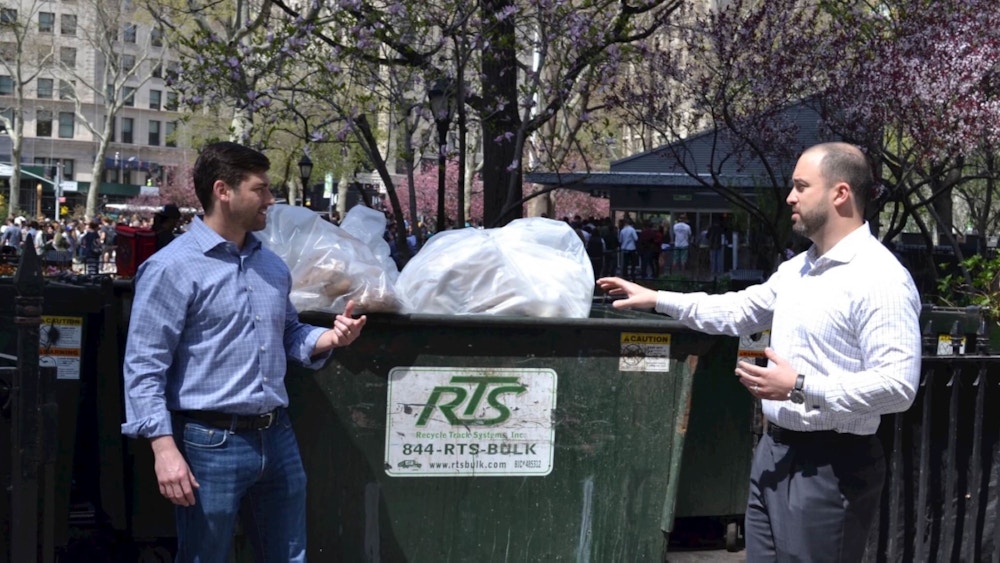Read full article from TechNYC here
Q: What does your company do?
Adam: Recycle Track Systems co-founder and COO Adam Pasquale: Recycle Track Systems is a waste and recycling management company that focuses on technology and data to optimize waste operations and decrease the amount of waste going to landfills. We developed on-demand waste removal through our app — which has been referred to as the ‘Uber for Trash’, but we also provide full-service solutions leveraging our technology platform to support clients’ end-to-end waste operations. For example, we can pick-up food waste from a large restaurant and bring it straight to a farm where it is converted to compost, while providing real-time confirmation the material was collected and the amount that was recycled.
Q: How did you come up with the idea of Recycle Track Systems?
Adam: I’m a fourth-generation member of a New York waste-hauling family. I’ve personally been involved in the waste and recycling sector for nearly two decades in NYC. During that time, I saw an industry that was ripe for change and a critical need for greater transparency in our waste system. My co-founder, Greg Lettieri, has a background in tech, so together we developed the concept for RTS. Technology enables us to do this and is the center of our business model.
Q: You’ve built an incredible network of partners, ranging from SoulCycle to WeWork, and Whole Foods to the Four Seasons. How did you scale so successfully while still remaining committed to your mission of sustainability? What do you look for and prioritize as you continue to grow?
Adam: One of the reasons we built our platform the way that we did is so that we could scale responsibly. We continue to look at ways we can further optimize waste operations so we can provide solutions that will meet the specific needs of our partners. Hiring diverse talent and expanding relationships with local hauler partners is also key.
Q: You’ve also worked with municipalities to improve city operations and infrastructure. How do you see public-private partnerships, especially in tech, working to solve issues of importance?
Adam: Technology is definitely a driving factor that can help utilities run more effectively in communities and support sustainability goals. Improving truck routing alone can decrease the amount of time trucks are on the road. In addition, we work with local, independent haulers, who are vested in the communities they serve and want to be a part of advancing their operations.
Q: As a fourth generation veteran in the waste industry around the New York area, how has the city shaped not only your view of running a tech company, but approaching waste management at large?
Adam: New York is an incredible place to tackle the challenges of the waste industry given its size and logistics. We knew if we could be successful in this market, we would be able to scale effectively. There are also very few cities in the country that have a concentration of companies across a variety of industries that are all looking to achieve greater sustainability goals and adopt emerging technology.
Q: Two huge institutions, Citifield and Barclay’s Center, have benefited from your waste diversion programs. What role do you see iconic establishments playing in the sustainability conversation?
Adam: A lot! Sports facilities like a Citi Field and Barclay’s Center are great examples of instituting forward-thinking sustainability policies, which have paved the way for other industries to take note. As the expectations on corporate responsibility increase, and as transparency becomes more prevalent, more and more companies will be forced to recognize the need to act on sustainability.
Q: Where do you get your favorite pizza slice?
Adam: : Fiore’s Pizza in the Village.
Q: Where do you get your favorite bagel?
Adam: : Murray’s Bagels.
Q: What is the best New York waterfront?
Adam: : Ellis Island & Liberty Island.
Q: What’s your favorite New York building?
Adam: : Chelsea Market.
Q: What’s the best place in New York for a coffee or lunch meeting?
Adam: : Grey Dog Cafe in the West Village.
Q: What’s one thing to help the planet every New Yorker should do on Earth Day?
Adam: It’s hard to say just one, but think before you throw it out — what could you do differently to create less waste?
Q: Straws: paper, plastic, or metal?
Adam: I opt to not use straws altogether.
Q: What does sustainability mean to you?
Adam: Renewing our resources and reducing our harm on the environment.
